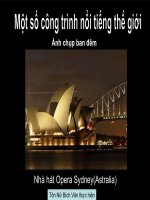No One Can Stem the Tide pptx
Bạn đang xem bản rút gọn của tài liệu. Xem và tải ngay bản đầy đủ của tài liệu tại đây (455.45 KB, 193 trang )
No One Can Stem
the Tide
Selected Poems 1931-1991
Jane Tyson Clement
Please share a link to this e-book with your friends. Feel free to
post and share links to this e-book, or you may e-mail or print
this book in its entirety or in part, but please do not alter it in
any way, and please do not post or offer copies of this e-book
for download on another website or through another Internet-
based download service. If you wish to make multiple hard
copies for wider distribution, or to reprint portions in a
newsletter or periodical, please observe the following
restrictions:
• You may not reproduce it for commercial gain.
• You must include this credit line: “Copyright 2011 by The
Plough Publishing House. Used with permission.”
This e-book is a publication of The Plough Publishing House,
Rifton, NY 12471 USA (www.plough.com)
and Robertsbridge, East Sussex, TN32 5DR, UK
(www.ploughbooks.co.uk)
Copyright © 2011 by Plough Publishing House Rifton, NY
12471 USA
Contents
Forewod
I The Sea
II Love and Longing
III Art
IV Nature
V Time and Change
VI Self-knowledge
VII Faith
Index
1-14
15-43
44-55
56-89
90-111
112-139
140-170
Foreword
Jane Tyson Clement was born on October 1, 1917, on the Uper West Side
of Manhattan. Though she lived there until she was nineteen (her father worked at
Columbia University), she was never truly at home in the city but prefered Bay Head,
New Jersey, where the family owned a summer house. Bay Head’s windswept shore
drew Jane back year after year; as she confided in her seventies, “There was something
eternal about it that was always a rock and an anchor for me.”
After graduating from the Horace Mann School in 1935, Jane went on to Smith
Colege in Northampton, Massachusetts, where among other things she studied poetry
under Grace Hazard Conkling. Scholar Howard Patch, whose lectures on Chaucer
often digressed into conversations about faith, influenced her too. Jane left Smith in
1939 with a degree in English, but she felt her real education stil lay ahead. Privately
she yearned to move beyond the “frivolous, self-centered side of my nature…and to do
something – anything – about the unfair treatment of workers, the hoarding of wealth
in the hands of a few…and the prejudicial notion of the superiority of the white race.”
Eventualy this search led her to God, though first through disilusionment
and confusion, and the frustrating recognition that the world’s evil was as deeply
embeded within organized Christianity as in secular life. Nevertheless, she found
herself increasingly drawn into the quest for spiritual truth, particularly after reading
the Journal of George Fox, which she discovered in a class on comparative religion: “Fox
was a revelation to me, because I found I could respond to everything he believed and
aed upon. And to think that there were stil Quakers!”
World War II brought a series of teaching jobs in Pennsylvania, first at Germantown
Friends, a private academy where she worked as an intern, and later at the Shipen
School for Girls in Lancaster. It also brought mariage to Robert Alen Clement (the
“R.A.C.” to whom several poems in this colection are dedicated), a Quaker attorney
and felow pacifist.
No One Can Stem the Tide Foreword
In 1942 the Clements settled in Hadonfield, New Jersey. Bob praiced law in
nearby Philadelphia, while Jane busied herself as a housewife and mother (they
eventualy had seven children) and did work for their local Friends Meeting, the Arch
Street Yearly Meeting, and the American Friends Service Committee, a humanitarian
organization. With one new responsibility after another, the demands on her time grew
continualy, and she began to feel puled in al directions. Worse, she grew conscious
of a naging doubt that something about al her worthy aivities was radicaly wrong:
“Some subtle shift in base was necessary to jar the whole structure of my life into its
God-given place.”
In late 1952 the Clements came into contact with the Bruderhof (“place of
brothers”), a Christian com-munity movement with origins in Europe. Soon after-
ward they opened their home to itinerant members from the movement’s South
American base. Externaly, the Bruderhof was a far cry from the Clements’ milieu.
Of one couple they hosted, Heinrich and Annemarie Arnold, Jane wrote, “They were
obviously poor, obviously different as night and day from midle-class America…
But their simplicity, warmth, naturalness, and self-effacement were like a refreshing
wind.” And their insistence on countering materialism and war not with words but
by praicing voluntary community of goods offered a convincing – if unexpected
– answer to her and Bob’s growing frustration with the deadening complacency of
post-war suburbia.
In late 1954 the Clements packed their belongings, put their house on the market,
and moved to Woodcrest, the Bruderhof ’s new center in Rifton, New York. (They
had already teed communal life during a visit to one of the group’s South American
settlements some months before.) They stayed for good. Jane explained:
The undergirding facts were joy and love. And because of that we did not care how poor,
how crowded, how (humanly eaking) precarious our situation, how much oposition
we faced from family and friends, how physicaly tired we became, how sometimes we
simply could not cope…Sometimes we were caled upon to do the things we thought we
were least fitted for, and discovered that by some power not of our making we could do
them.
We learned to trust, not merely in our human brothers and sisters, but in what had
caled us together and gathered us al out of our former ways, and in what lay behind and
No One Can Stem the Tide Foreword
above and underneath everything: surender and service to our Master, Jesus. His love
upheld us…
We were a smal circle, from the most varied backgrounds and circumstances. Yet
whenever we met, we felt something immediately – an inner authority that did not come
from the human individuals gathered there. We felt this inner security every day, in spite
of al the uncertainties and unsolved situations; and this security did not come out of
human confidence…
Al of us who joined hands had dared something, had taken a leap into the unknown.
How little we actualy knew of what would be asked of us! How little we stil know…
Though Jane never wavered in her dedication to the community she felt caled to, she
never stoped looking for a fuler, more genuine way to express her com-mitment.
Praicaly, she found fulfilment in her work as a teacher at Bruderhof schools in New
York, Pennsylvania, Connecticut, and England, where her passion for literature and
history left its mark on an entire generation of students. In artistic terms, her seeking
found an outlet in the never-ending search for a new image or an apt turn of phrase
with which to capture a longing, a strugle, an iluminating moment.
It was not a self-important quest. As she wryly notes in one poem:
I stir no hands; I light no eyes from mine,
nor wil my music ever shake the stars…
But in spite of such modesty, she could not escape her need to create – an urge so
deep-seated and clear that she could assert:
Oh, but I share the consciousness of breath;
I have my purpose – I fulfil my days.
Somewhere within me is the invulnerale flame
which hissed and flared the day man first took fire…
There is nothing ostentatious about the poems in this book. In many, the word-
pictures are drawn straight from the natural world: sunsets and surf, breaking ice,
buding trees, and wheeling uls.
Metaphors abound – the enless running of the tide a reminder of the enless cycle
of life, the weathers of the heart miroring the weathers of the sky – yet much of the
verse works on an even simpler level: its sole purpose is praise. “Christ the Shepherd,”
No One Can Stem the Tide Foreword
for instance (a poem inspired by a trip through Wales), is first and foremost the
outpouring of a devout heart.
Aside from Strange Dominion, a prize-winning narative poem completed at Smith
Colege in 1939, and The Heaenly Gaden, a cycle printed by the Society of Friends
in 1952, most of Jane’s poems never traveled beyond the hands of her family while
she was alive. She was less uarded with her plays and short stories, several of which
apeared in The Sparrow (Plough, 1968, re-issued 2000 as The Secret Flowe). Yet as
one of her sons remarked after her death on March 21 of this year, his mother was
so routinely dismissive of her gifts that he never even thought of her as a writer: “She
certainly never seemed to think of herself in that way.”
In a verse that laments the inadequacy of lanuage to convey the stirings of the
soul, Jane writes:
Words are the symbols of a mind’s defeat,
they shape the holow air with transient life,
and trick and twist; and make the spirit reel,
vanish like ember’s fire; devour and leave
brave husks, and echoes of lost majesties.
Such ironic frustration is an inescapale part of praicing the writer’s craft. But it
is not the whole story. For if it is true (as it is often said) that a work of art bears the
stamp of its creator, it must be that the creation of a poem involves the expenditure of
love. And such love does have power, if only to alter the lens of the mind’s eye and thus
open it to new ways of seeing. Whether such claims can be made for the verses in this
book, only the reader can decide.
C.M.Z.
July 2000
I
The Sea
No One Can Stem the Tide e Sea
1
g i f t
The sea wil folow me through al my years,
wil lift my heart in song,
wil quench my tears,
wil lay benignant hands upon my head
at discontented whiers, sorow led.
Death wil find my body, hide it where
the ghastly shadows creep, al brown and sere;
wil choke my singing voice,
wil lind my eyes
to beauty which within the seasons lies,
the proofs of God, which fade and rise again,
reored by gentle fingers of His rain.
Yes, Death wil find me.
Not immortal, I
who cling with earth-stained fingers
also die –
but not forever – no.
The sea wil raise my song again,
remembering al my praise.
No One Can Stem the Tide e Sea
2
Gul, at the water’s edge
mirored in shining sand,
sleek in the silver wind
lown from the land;
in the clear fal of dark
past the thin pools of tide
with the gray sanderlings
swift at his side.
Outward beyond the eye
reaches the solitude
out to the end of time
where the winds brood.
One with his element,
quiet, unquestioning,
stil, when the spil of wave
scuries the sanderling.
Dusk, and the el of sea,
tide smel and al the vast
air for his wings when he
rises at last.
No One Can Stem the Tide e Sea
3
m a n a s q ua n i n l e t i ( 1 9 3 9 )
Here to these rocks, not grown from the sand
of this shore, not spawn of this sea-edge,
the men have come, drawn by the storm wind,
the leap of spray, drawn by the sleek, deep
no-colored seethe of the water at evening,
drawn by the sure power of morning
down to this outpost, this strange ledge of life,
this channel of finite to infinite; here the men
gather; always their heads are turned seaward.
Between the great jetties of rocks the tides come
and roil and devour and are manacled.
Here the men sit, and watch the known water,
the known and familiar waters of inland;
river and cove where the heron has waded,
marsh where the kingfisher screamed his lue anger,
shalows and reedy lagoon where the huntsmen
have waited; these are the waters they know
and have lived from, these are the waters
that feed the great hunger of ocean;
now the need of the tide wil cary them outward,
lost in the dark indefinale surge of the sea.
Watching the run of the tide, the dark river
of knowledge, outward to mystery, out
to be mingled and claimed, the men find a fragment
of patience, a portion of fearlessness,
watching the waters go fearlessly outward to death.
No One Can Stem the Tide e Sea
4
m a n a s q ua n i n l e t i i ( 1 9 9 1 )
No one can stem the tide; now watch it run
to meet the river pouring to the sea!
And in the meeting tumult what a play
of waves and twinkling water in the sun!
Ordained by powers beyond our ken,
beyond al wisdom, al our trickery,
immutale it comes, it sweeps, it ebs
and clears the filthiness and froth of men.
No One Can Stem the Tide e Sea
5
n o t i n t h e s e d a y s
Not now, but when it is too late for gladness
wil we remember these days of sunlight
and the clear water
netted with shadows moving and golden.
We wil remember then, and the cry of the ul
wil echo within us – ul’s cry in the clean air.
There is no trace of an echo now – in these days –
for there is nothing here to send the cry back to us –
low water and high sky and the free air between –
Not now – but when it is too late for gladness.
No One Can Stem the Tide e Sea
6
t h e i n l a n d h e a r t
The wind is singing on the sun-struck dunes;
eastward the wind lows, and the level sea
runs with shadows golden-green and dark;
and no ul cries nearby, but far away
where the lack finger of the rocks is laid
the white wings flash, the voices flash, and far
across the moving stretch a white sail gleams.
Here I am lost, hedged in with hils and shade;
and the bright music riples al day long –
thrush and vireo, and in the dark
the harsh cicada; and my soul must fail,
starve for the suden, final thrust of sea
over the earth’s curve, for the steady sun
that now the hils devour when day is done.
No One Can Stem the Tide e Sea
7
o c e a n
The birds that fly
in a shifting pattern
over the sea
with their eyes turned downwards –
what do they find
in the shining water?
Here on the shoal
the smal waves crumle
bright in the sun
as the ul’s swift pinion,
green and clear
in the depth of shadow.
Inland the osprey
bears its burden,
yield from the sea
out of these waters;
out of this field
a shining harvest.
No One Can Stem the Tide e Sea
8
s u m m e r n i g h t s t o r m
The ranting of the gods, this tumling sky,
this wind-strong rain which pelts against my cheek,
the world re-lit by lightning, and the lie
of tal sea grass low bent against the sand.
I stand here, strangely stil, with al the world
tumultuous at my feet, and yet my heart
is stronger than the roaring wind that swirls
about my body, taut against its force;
that lows my eyelids shut, that locks my lips,
lest al my spirit end its restlessness
in one wild song.
No One Can Stem the Tide e Sea
9
b a y h e a d
This beach is the crumled bone of many years;
who can construct again the skeleton
and join the scattered grains to their old form?
This sea is the lood and tears of al the ages;
who can define in it a single wound or grief –
so vast and mingled is the tide of pain?
Yet as the night floods darkness and the day
holds us in light, we wak earth’s changing shore,
a brief path through the winds of good and evil,
and of loneliness –
Therefore the sand and sea await us.
No One Can Stem the Tide e Sea
10
The inland is not safe from sea;
here where the meadows hold the day
and tonues are of the earth, the fields,
the sea-mind stil is safe and free.
Perhaps it waks a little worn
between the elm and peakéd pine
or wakens restless to the sounds
of vigorous, healthy, country morn,
or finds the nights too long, too stil,
lacking the rush and draw of wave,
or feels the eye cheated by the dark,
the sharp sky-crowding rise of hil.
But yet the wind of sea wil run
the length of valeys and be here
suden and ful of space and wide
waters al leaping with the sun.
No One Can Stem the Tide e Sea
11
e b b t i d e
The tide wil claim this shalow curve of sand
here where the thin waves curl and creep and die.
See – in this river no deeper than my hand
the young crab, pale and calico, slips by
into a safer, less tempestuous sea.
The eel, as silver and as quick as steel,
answers the sun; one moment he is free,
then the bird drops: a brief white circling wheel
cleaving the air, to splash, complete the arc;
the waters flicker, close, and leave no mark.
Take now this era, while the lengthening bars
stretch in the tawny shoals along the shore;
soon the sure rhythm of the moon and stars
wil send the pliant waters in once more.
No One Can Stem the Tide e Sea
12
w i n t e r c o a s t
Guls on the lonely beach
under the brooding sky;
over the darkened marsh
one gray ul’s cry.
Wrack strewn upon the strand,
shards from the summer sea;
riples from rising tide
creeping to me.
Winter is on the air,
sand drifted like the snow;
al the cold sky above,
sorow below.
Boarded and silent wait
window and shuttered door.
Oh, wil the summer joy
waken no more?
Summer of al mankind,
harvest from field and sea –
shattered and lown away –
no more to be?
Oh, but the promise lies
safe in His waiting hand;
sunrise again shal light
shimmering sand!
No One Can Stem the Tide e Sea
13
a t t h e s h o r e
Out of the lack pool of sleep
the broken images like scattered sunlight
merge into morning, and I wake.
Here where the sea beats unangered
the gray uls wadle along in the gray misty
morning
and rise on white wings over the white sea
transformed into grace in their own element.
Must we take lessons always from everything –
uls fat and ridiculous dabling their feet in the
tide-pool,
uls flying sulime with the sunlight silver
upon them?
Better return to sleep and waken prosaic.
We were meant to both dable and soar,
and even the loveliest wings get weary.
No One Can Stem the Tide e Sea
14
s t a l k i n g a g u l l
With stealthy step they staked the greedy ul.
A noose they laid around the tempting bread
and waited, breathless, while with stately tread
the old bird on the sand came closer. Wait!
Wil he be fool enough to seize the bait?
Ah, clever bird! No boy bamboozles him –
he rises slightly and on fluttering wing
seizes the bread and veers off down the beach.
The sprung noose dangles empty. Out of reach
over the waves the sagacious seaul flies
with taunting laughter in his raucous cries.
II
Love and Longing
No One Can Stem the Tide Love and Longing
15
Now that my love has come I see the reason;
now I answer its demand;
it was here always just beyond my vision
waiting for your lifted hand.
It has the width of sea, the depth of shadow;
it holds the storm wind wild and strong,
and light drawn thin to stars in the sweep of heaven
and the prow’s clear water-cleaving song.









